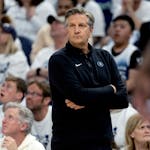If you strip away all the talk of analyzing his motion, his mechanics, all the details of his nearly yearlong attempt at a comeback from surgery, this is perhaps the most important thing that Wolves vice president of sports performance Arnie Kander had to say about center Nikola Pekovic on Tuesday:
"He will be fine," Kander said. "He will be Nikola Pekovic again."
But it likely won't happen this season after the team announced Tuesday that Pekovic would be out indefinitely.
For Pekovic, who underwent a debridement and repair of his right Achilles' tendon April 8 of last year, it is another step in his long and difficult quest to return to peak form.
What has shut him down this time is not necessarily the Achilles, which Kander says was repaired well and looks very good. The problem is heel pain that is related to surgery that surfaced during Pekovic's attempt to return to action.
"It's not because of the surgery, but because of the weakness he had secondarily to the surgery," Kander said. "It's giving him heel soreness."
Typically, Kander said, it takes from nine to 15 months to recover fully from such surgery. Pekovic's size and physical style of play puts him at the long end of that spectrum. He missed the first 35 games of the season while rehabbing and trying to regain strength. Pekovic, Kander and the team decided to put him back on the court when he reached about 85 percent strength in that leg, and after tests determined he was moving well.
In retrospect, that wasn't enough, especially the way Pekovic plays.
He returned for 12 games with a strict minutes limit, averaging 4.5 points and 1.8 rebounds. But he quickly started developing heel soreness.
"Because of the Achilles and the weakness, you're going to hit your heel a little bit harder when you come down," Kander said. "So what we found is he was getting heel soreness. … When you get soreness your muscles get a little weaker."
Tests showed his calf had gotten weaker, down to about 78 percent of full strength. It was at that point that Kander decided to pull Pekovic back.
Now the plan is Pekovic won't play until his strength returns to 95 percent or better.
"It's not going to work at 85 percent, that didn't work for him. We tried," Kander said. "So could he play this year? I never say no to that. If he demonstrates no heel soreness and his strength rises pretty quickly and he can run without pain there is a possibility he plays this year."
But Kander said he's confident that Pekovic will, eventually, be 100 percent again. Tests showed a little irritation in the heel that was away from the Achilles.
Perhaps more important, Kander said, is that Pekovic believes he will come all the way back, too.
"I think he sees a good picture now," Kander said. "He knows that I pulled him back. … I'm being proactive. I'm making sure he's healthy."
Pekovic is in the middle of a five-year, $60 million contract that he signed before the 2013-14 season; he is due to make nearly $24 million in the next two seasons. But, since signing the deal, continuing problems with the foot/heel have limited him to 97 appearances out of a possible 221 games.
But Kander, certain the Achilles is now fundamentally OK, believes getting back to full strength will get Pekovic back to the player that earned that contract.
"Right now we're not rehabbing technically, we're just gaining more strength in that area," Kander said. "But he sees a bit of light at the end of the tunnel.''





